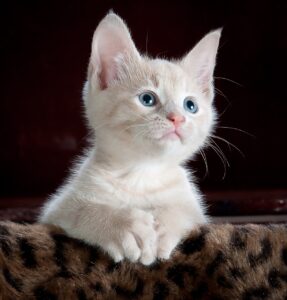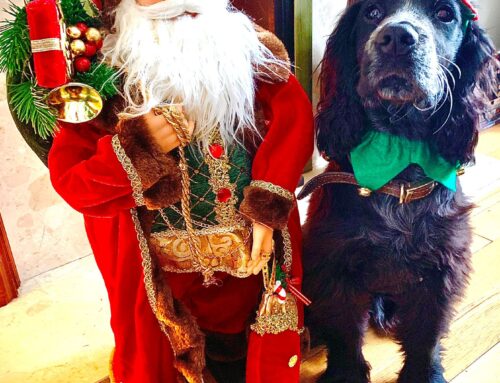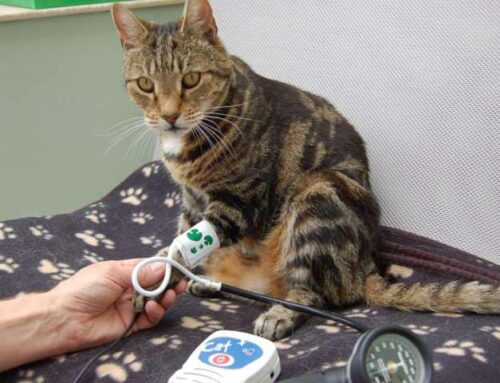The bright flashes and loud bangs of fireworks can be exciting and fun for us, but for our pets they can be confusing and frightening.
This is because it’s difficult for them to understand that they aren’t in danger when they hear/see them, and their senses are much better than ours – so they experience fireworks much more intensely than we do!
Helping your dog to cope with fireworks
 The bright flashes and loud bangs of fireworks might be exciting for humans, but can be really scary for dogs. This is because it’s difficult for them to understand that they aren’t in danger when they hear/see them, and their senses are much better than ours – so they experience fireworks much more intensely than we do!
The bright flashes and loud bangs of fireworks might be exciting for humans, but can be really scary for dogs. This is because it’s difficult for them to understand that they aren’t in danger when they hear/see them, and their senses are much better than ours – so they experience fireworks much more intensely than we do!
Walk them whilst it’s still light before fireworks are likely to start. A longer walk with plenty of opportunity to sniff and explore will tire your dog and help them to relax, but remember to keep them safely on a lead in case an early firework frightens them and causes them to bolt.
Close your curtains before dark and leave the lights on to hide the flashes.
Play some music to help drown out fireworks noises. Classical can work well, or something with a deep bass to help cover up any bangs – just make sure it’s at a volume your dog is comfortable with (not too loud)! It’s worth starting this a few days/weeks ahead so your dog gets used to the music before fireworks night. There are some great playlists available on spotify and other music streaming services.
Stick to normal routines and behave normally but, if it helps, distract them with something fun such as a game, a puzzle feeder, or a toy stuffed with food.
Make them a den for them to hide in if they wish. This video from the PDSA will show you how.
Comfort them if they come to you for reassurance – don’t ignore them, but if they want to be alone, let them (just keep a close eye on them).
Wait for a gap in the fireworks to take your dog out to the toilet, be as quick as possible and keep them on a lead at all times. Never let them out on their own during fireworks season – it’s common for dogs to bolt from their garden after being startled by a firework.
Keep them calm and relaxed with pheromones, which are chemical messages that dogs produce to communicate with each other, some of which help them feel calm. We can recommend suitable diffusers, sprays, collars and wipes that produce the same effects.
Use calming supplements and herbal remedies to help your dog relax. These work in a variety of ways, depending on their specific ingredients. Some supplements are more effective than others, and each dog responds differently, so if one type doesn’t suit your dog, you may find that a different brand works better. Please contact us for advice.
Try a compression shirt, which is a tight-fitting vest that provide a gentle calming pressure (similar to swaddling a baby) to help soothe anxiety. Only use a compression shirt if your dog is comfortable with it as it could cause further distress if they feel too restricted.
Never punish your dog for anything they do when they’re scared – this will just scare them more.
And Remember to check that your dog’s microchip details are up-to-date to give you a better chance of being reunited if they run away from home.
If your dog is still scared of fireworks despite all of these steps our vets may be able to prescribe some stronger medication to help. Please contact us to discuss this, and any of the above, to help keep your dog as calm as possible during firework season.
For further advice please visit Dogs and Fireworks – PDSA
Helping your cat cope with fireworks
 The bright flashes and loud bangs of fireworks can be exciting and fun for us but, for our cats, they can be confusing and frightening. This is because it’s difficult for them to understand that they aren’t in danger when they hear/see them, and their senses are much better than ours – so they experience fireworks much more intensely than we do!
The bright flashes and loud bangs of fireworks can be exciting and fun for us but, for our cats, they can be confusing and frightening. This is because it’s difficult for them to understand that they aren’t in danger when they hear/see them, and their senses are much better than ours – so they experience fireworks much more intensely than we do!
Here are some top tips to keep your cat safe and calm on fireworks night:
- Get them inside well before dark and make sure all windows and cat flaps are shut/locked so they can’t get back out. It might be worth getting them used to a slightly earlier dinner time a few weeks ahead, so they get used to coming home before dark.
- Close your curtains before it gets dark and leave the lights on to hide the flashes.
- Make them a den to hide in if they wish. This video from the PDSA shows you how https://youtu.be/K263-610wiw
- Give them a litter tray near their den – if you have multiple cats, they will need one tray each, plus a spare so they don’t have to share.
- Play some music to help drown out the noises from fireworks. Classical can work well, or something with deep bass to help cover up any bangs – just make sure it’s at a volume your cat is comfortable with i.e. not too loud! It’s worth starting this a few days/weeks ahead so your cat gets used to the music before fireworks night.
- Keep them calm and relaxed with pheromones. These are chemical messages that cats produce to mark their territory and communicate with each other, some of which help them feel calm. You can help your cat feel extra calm by using a pheromone diffuser, or spray, which contains man-made ‘happy’ cat pheromones. For the best effect, plug a diffuser in a few weeks before firework season begins and keep it topped up until the season has ended.
- Use calming supplements and herbal remedies to help your cat relax. These work in a variety of ways, depending on their specific ingredients. Some supplements are more effective than others, and each cat responds differently, so if one type doesn't suit your cat,
you may find that a different brand works better. Please contact us for advice. - Try to stick to normal routines and behave normally but, if it helps, distract them with something fun to do such as a game, some treats, or a toy stuffed with food.
- Comfort them if they come to you for reassurance – don’t ignore them, but if they want to be alone, let them (just keep a close eye on them). Don’t pick up or restrain your cat if they are scared – cats prefer to control how they cope.
- Don’t confine them to one room, while well-intended, this confinement may increase a cat’s stress. Cats may be tempted to squeeze into a tight space when they are scared so you might want to ensure that any unsuitable areas are blocked off to keep them safe.
- Never punish them for anything they do when they’re scared – this will just scare them more.
- And remember to check that your cat’s microchip details are up-to-date to give you a better chance of being reunited if they run away from home.
If your cat is still scared of fireworks despite all of these steps our vets may be able to prescribe some stronger medication to help. Please contact us to discuss this, and any of the above, to help keep your cat as calm as possible during fireworks season.
For further advice please visit Cats and Fireworks – PDSA
Helping Small Pets cope with Fireworks
 Small pets like rabbits, guinea pigs, hamsters, gerbils, rats, and mice are very sensitive to loud noises and stress. Luckily, there are plenty of little things you can do at home to keep them calm throughout the firework season.
Small pets like rabbits, guinea pigs, hamsters, gerbils, rats, and mice are very sensitive to loud noises and stress. Luckily, there are plenty of little things you can do at home to keep them calm throughout the firework season.
- If they live outdoors, bring them inside for firework season/when fireworks are going off. Try to put them in a cool room so they aren’t stressed by the sudden change in temperature. If this isn’t possible, move their hutch into a car-free garage or shed. If the hutch can’t be moved indoors, turn it to face the wall at night, or partly cover it with blankets to block out as much light and sound as possible whilst still making sure there is good ventilation.
- Give them plenty of hiding places so they feel safe – cardboard boxes or tubes work well, just make sure they have more than one entrance/exit so they don’t feel trapped.
- Give them lots of extra bedding to help keep noise out and provide a hiding place.
- Close curtains before it gets dark and leave the lights on to hide the flashes.
- Play some music to help drown out the noises from fireworks. Classical can work well, or something with a deep bass to help cover up any bangs – just make sure it’s at a volume your small pet is comfortable with i.e. not too loud!
- Keep them occupied with their favourite treat or toy.
- Keep bonded pairs/groups together so they feel safe and secure.
- Never light a bonfire/sparklers/set off fireworks anywhere near them – the sight, smell and noise will be terrifying, and smoke can cause breathing problems. If your neighbours are having a bonfire/fireworks bring your pets inside.
For further advice please give us a call or visit Small Pets and Fireworks – PDSA




